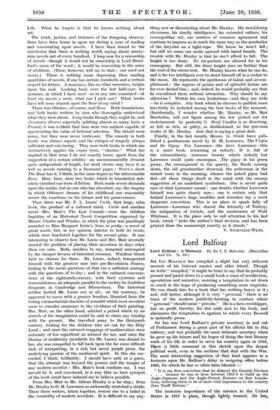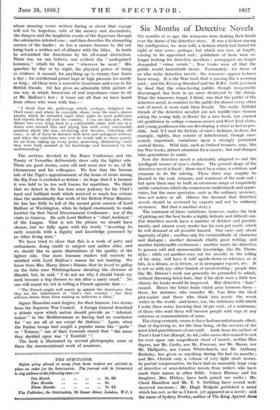Lord Balfour
Lord Balfour : A Memory. By Sir I. Z. Malcolm. (MacMillan
and Co. 7s. 6d.) .
Sru IAN MALCOLM has compiled a slight but very welcome memoir of his beloved master and elder friend. Though we write " compiled," it might be truer to say that he probably pruned and pared down to a small book a mass of recollection; speculation and narrative, resisting a temptation to set down so much in the hope of producing something More exquisite. We can thank him for a book that has nothing heavy in it ; and still better, although it is :very "personal, there is no trace of the modern publicity-hunting in matters where " personal " should mean" private." He is a hero-worshipper, but we profit thereby, for this adds zest to the book, and eliminates the temptation to egotism 'to Which every Boswell is- naturally prone.
Sir Ian was Lord 13alfour's private secretary in and out of Parliament during a great part of his official life in thia century, and was probably his most intimate secretary when he gave up his leisure and his hopes of doing the best literary work of his life in order to serve his country again in 1916.
There is little comment in this sketch - upon the deeper political work, even in the sections that deal with the War. The most interesting suggestion of that kind appears in a footnote upon Mr. Balfour's delay in resigning office before 1905, for which he has so often been blamed
" It is my firm conviction that he delayed the General Election . . . because he was so keen between 1002-5 to build up the Anglo-Japanese and the Anglo-French Ententes on firm founda- tions, believing them to be of more vital importance to the country than Tariff Reform."
The immense importance of -the . mission to. the United States in 1917 is plain, though lightly treated. Sir Ian,
whose amusing verses written during or about that voyage will not be forgotten, tells of the secrecy and discomforts, the dangers and the laughable events of the departure through the- submarine-infested seas ; and then describes the abounding success of the leader ; no less a- success because he did not bring back a written act of alliance with the Allies. In truth he astonished the Americans by his all-round distinction.
There too, we can believe, was evident the "undisguised keenness '! which Sir Ian saw "wherever he went." His speeches by day or by night, his physical power of being en evidence, it seemed, for anything up to twenty-four hours
a day ; his intellectual power kept at high pressure for nearly as long ; all these were a marvel to Americans and even to his British friends. Sir Ian gives an admirable little picture of one way in which Americans of real importance came to sit at Mr. Balfour's feet : it bears out all that we have heard from others who were with him :—
" I think that the gatherings which, perhaps, delighted the Chief most, and where he especially shone, were the men's dinner parties which he attended night after night to meet politicians and experts from all over the country. I can see him now, when dinner was over, lying back in a comfortable chair, with ten or a dozen men around him and plying him with every conceivable question about the .war, advancing new theories, criticizing old ones ; to all of them he listened with keen and unfeigned interest, and when the catechism was over he would talk to them quietly for an hour, taking up every point, answering, illustrating—until they were both amazed at his knowledge and fascinated by his understanding."
The sections devoted to the Peace Conference and the Treaty of Versailles deliberately show only the lighter side. There are good stories, some old and some new to us, of M. Clemenceau and his colleagues. We fear that the famous
tale of the Tiger's apportionment of the hours of siesta among the Big Four is excluded as fiction : we hope that it is because it was held to be too well known for repetition. We think that we detect in Sir Ian here some jealousy for his Chief's hard and brilliant work which received so much less reclame than the undoubtedly fine work of the British Prime Minister.
Sir Ian has little to tell of the second great success of Lord Balfour at Washington, when he helped enormously to make fruitful the first Naval Disarmament Conference : nor of the visits to Geneva. He calls Lord Balfour a "chief Architect"
of the League. That is not the phrase we should have chosen, but we fully agree with the words "investing its
early councils with a dignity and knowledge possessed by no other living man."
We have tried to show that this is a work of piety and enthusiasm, doing credit to subject and author alike, and we should like to quote illustrations of the quality of the lighter side. Our more humane readers will scarcely be satisfied with Lord Balfour's reason for not hunting. We know from Mrs. Harry Drew's Diaries that he loved to gallop
on the links near Whittingehame shouting the choruses of Handel, but, he said, "I do not see why I should break my neck because a dog chooses to run after a nasty smell." No one will resent his wit in telling a French agnostic that :— " The French might well assert, as against the Americans, that they are the inhabitants of 'God's own country ' ; but their atheism deters them from making so ludicrous a claim."
- Signor Mussolini must forgive, for their humour, two stories
from the Supreme War Council. A foreign General described a debate upon which nation should provide an " Admiral- issimo " in the Mediterranean as having had no conclusion for "we are all at sea except the Italians." Again, when the Italian troops had sought a popular name like " poilu " or "Tommy," one of their Generals stated that "the name
they decided upon was '1 " !
The book is illustrated by several photographs, some of them the unconventional work of amateurs. -



















































 Previous page
Previous page